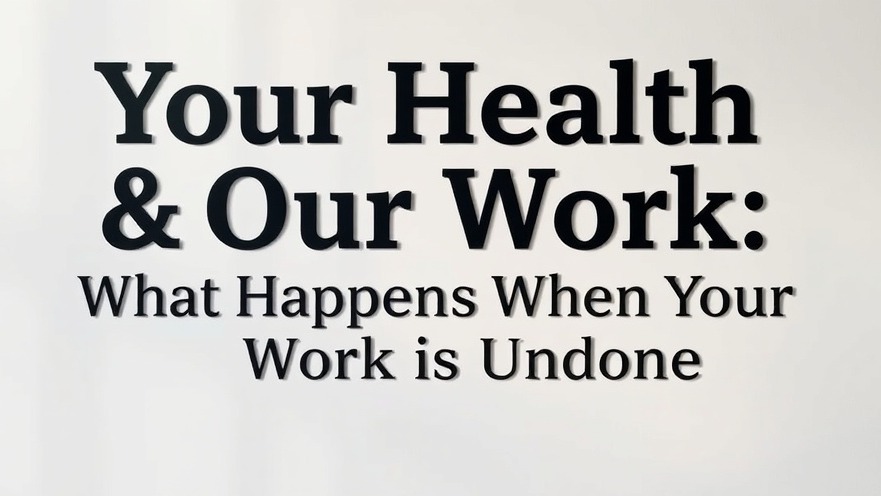
Understanding Austin's Public Health Crisis
Austin, Texas, is currently grappling with a significant threat to its public health infrastructure due to abrupt changes in federal grant funding. As outlined in Austin Public Health's recent StoryMap, titled Your Health, Our Work: What Happens When the Work is Undone, the ramifications of losing vital services are becoming increasingly clear. From immunizations to emergency preparedness, the community is at risk of losing critical health services that have been foundational to its wellbeing.
What’s at Stake: The Impact of Funding Cuts
The heart of this crisis lies in the fact that approximately 50% of the Austin Public Health (APH) department's budget is contingent on federal grants. As of mid-July 2025, APH anticipates losing around 9.5% of its grant-funding, raising alarms about potential cuts to essential programs. These cuts threaten to undermine health outcomes across Austin and Travis County, exacerbating health disparities among vulnerable populations.
Essential Services in Jeopardy
Several key programs face the prospect of reductions or outright elimination:
Mobile Vaccination Program (MVP): Once boasting a team of 15, this program is critical for delivering vaccines to uninsured and underinsured communities. With staffing cuts over 50%, the unit may struggle to reach its full potential during outbreaks like the recent measles crisis.
Public Health Emergency Preparedness (PHEP): This program coordinates with various agencies to prepare for emergencies, be they natural disasters or health crises. Funding losses could diminish its operational capabilities, which are vital for Austin's resilience against unexpected health threats.
HIV/STI Community Testing: This service is pivotal in offering confidential testing and treatment for underserved populations. Funding changes may severely limit its mobility and outreach, leaving many without essential services.
Refugee Screening Clinic: This clinic provides crucial health screenings and support to refugees and asylees navigating a new healthcare landscape. A loss of resources here could disproportionately affect those coming from countries in crisis.
The Broader Implications of Federal Funding Disruptions
Understanding the implications of losing these services extends beyond mere statistics; it touches the fabric of community health and safety. Adrienne Sturrup, APH Director, emphasized the dire need for more resources, stating that these changes present serious challenges. Traditional avenues for health services are now vulnerable, leading to heightened health inequities and putting the most marginalized residents at increased risk.
Community Resilience and Advocacy
Despite these challenges, APH remains committed to protecting community health. This unwavering dedication showcases the importance of advocacy not only for health resources but also for community awareness regarding public health issues. By leveraging the StoryMap's visual narrative, APH aims to garner support and inform the public about the critical nature of maintaining robust health services, highlighting the necessity for community involvement in advocating for renewed funding.
Looking Ahead: The Need for Action
To navigate the potential fallout from funding cuts effectively, community members, stakeholders, and local leaders must unite for advocacy efforts. Establishing coalitions focused on public health service preservation can lead to a stronger voice on policy matters. Echoing phrases from the health department such as “We will not stop advocating” is vital in bringing visibility to the cause, promoting not only the sustainability of health programs but the overall wellbeing of Austin's diverse populations.
To sustain public health services, residents are encouraged to engage with city leadership, participate in community discussions, and advocate for policies that safeguard crucial funding for health initiatives.
Conclusion: A Call to Community Action
The unfolding health crisis in Austin due to federal funding disruptions highlights the intricate balance between governmental support and public health outcomes. Protecting the community necessitates both immediate and sustained actions from every corner of society. Communities must rally together to advocate for public health and take proactive steps toward ensuring the resilience of essential services that promote the health of every Austinite.
 Add Element
Add Element  Add Row
Add Row 



Write A Comment